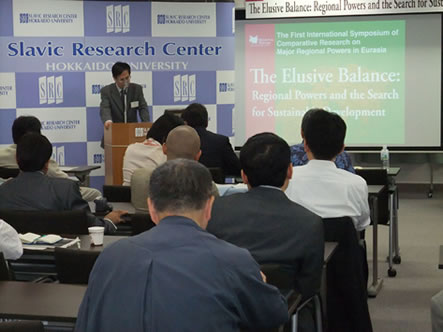| Annual Newsletter of the Slavic Research Center, Hokkaido
University |
Japanese English |
-->List
of All Publications-->Annual
Newsletter-->no.17 |
|
| No.17, January 2010 |
|||
| Our Current Staff |
Ongoing Cooperative Research
Projects |
Visitors from Abroad |
Guest Lectures from Abroad |
Publications (2008-09) |
The Library |
Website Access Statistics |
| Essays by Foreign Fellows |
||
| Andrew Gentes |
Dariusz Kołodziejczyk |
Marina Mongush |
The SRC SRC International Symposium
"The Elusive Balance: Regional Powers and the Search for Sustainable
Development" Was Held on July 9–10, 2009
The first international symposium for the scientific project, “Comparative Research on Major Regional Powers in Eurasia,” was held at the Slavic Research Center, Hokkaido University, on July 9–10. This project is funded by the five-year Grant-in-Aid for Scientific Research on Innovative Areas, supported by the Ministry of Education and Science of Japan. The title of the symposium was “The Elusive Balance: Regional Powers and the Search for Sustainable Development.” There were five sessions that compared the economies of Russia, China, and India from various viewpoints, including macroeconomics, energy, environment, poverty and inequality, and historical developments. There was also an additional session in which scholars from South Asian countries (India, Pakistan, and Afghanistan) discussed border issues.
 |
| A scene from one of the sessions |
The above-mentioned project included six research groups, one of which examined the possibility of sustainable economic development for the regional powers, headed by Professor Akira Uegaki of Seinan Gakuin University. It was this research group that organized this symposium. Four researchers of this group presented papers. Although this project started only last December, these papers gave us a preliminary result of the comparison of the regional powers, especially in the studies of macroeconomics and poverty and inequality. In addition, from sessions on energy and the environment, we learned the importance of these issues for the socio-economic development of these regional powers, as well as the importance of these regional powers in finding a solution to these global issues.
In the last session, economic developments of regional powers for the last several centuries were compared both by macroeconomic and inequality indicators. Two presenters attempted to provide an alternative picture and explanations for the catch-up of some East Asian countries from the state of “Great Divergence” between Western and developing countries.
Sixteen papers were presented altogether. From abroad, ten scholars were invited, including five from South Asia (India, Pakistan, and Afghanistan), two from East Asia (China and Hong Kong), and one scholar each from Russia, Finland, and the United Kingdom. It was probably the first time in the history of the SRC that we invited only one scholar from the Slavic Eurasian area for an international symposium. Most papers presented at the symposium will be included in Comparative Studies on Regional Powers, No. 2, which will be published soon.
Speakers of the Symposium
TABATA Shinichiro